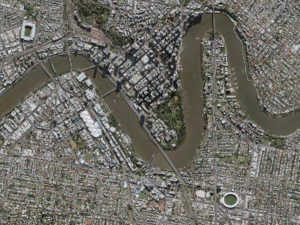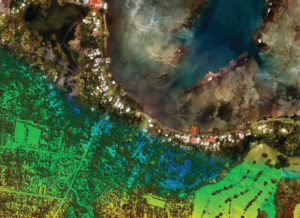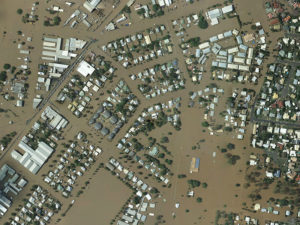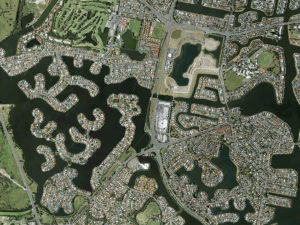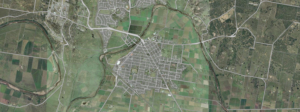Digital Earth (DE) can be defined as a multidimensional representation of the planet capturing natural, social, and cultural phenomena (Goodchild et al., 2012; ISDE, 2012).
This is an excerpt from Micheli, M., Gevaert, C. M., Carman, M., Craglia, M., Daemen, E., Ibrahim, R. E., Kotsev, A., Mohamed-Ghouse, Z., Schade, S., Schneider, I., Shanley, L. A., Tartaro, A., & Vespe, M. (2022). AI ethics and data governance in the geospatial domain of Digital Earth. Big Data & Society, 9(2). https://doi.org/10.1177/20539517221138767
Abstract
Digital Earth applications provide a common ground for visualizing, simulating, and modeling real-world situations. The potential of Digital Earth applications has increased significantly with the evolution of artificial intelligence systems and the capacity to collect and process complex amounts of geospatial data. Yet, the widespread techno-optimism at the root of Digital Earth must now confront concerns over high-risk artificial intelligence systems and power asymmetries of a datafied society. In this commentary, we claim that not only can current debates about data governance and ethical artificial intelligence inform development in the field of Digital Earth, but that the specificities of geospatial data, together with the expectations surrounding Digital Earth applications, offer a fruitful lens through which to examine current debates on data governance and artificial intelligence ethics. In particular, we argue that for the implementation of ethical artificial intelligence and inclusive approaches to data governance, Digital Earth initiatives need to involve stakeholders and communities at the local level and be sensitive to social, legal, cultural, and institutional contexts, including conflicts that might arise within those contexts.
Introduction
Digital Earth (DE) can be defined as a multidimensional representation of the planet capturing natural, social, and cultural phenomena (Goodchild et al., 2012; ISDE, 2012). Underpinned by both structured and unstructured, open or proprietary, spatial–temporal data, DE makes use of digital technologies to visualize, simulate, and model real-world situations. The concept of DE, initially popularized by Gore (1998), has long been loaded with the techno-optimism that often surrounds new technologies. DE has even been envisaged as a platform to support national and international cooperation for global sustainable development, economic growth, and well-being (ISDE, 2012). The optimistic vision of DE from 10 years ago, however, could not fully anticipate the impact of big data, machine learning, and artificial intelligence (AI) systems on the field.1 These are crucial for DE’s development due to the high volumes of data coming from multiple sources—from remote sensing to crowdsourcing projects—and the need to integrate data to build complex multiscale and multisector models.
In this commentary, we argue that DE offers a fruitful lens through which to address current debates on data governance and the ethical use of AI. In our view, the many important issues being discussed about the ethics of AI are fundamentally about both the data and the algorithms used by AI. We propose that not only can current debates about data governance and ethical AI inform development in the field of DE, but also the distinct characteristics of DE (and of the geospatial information from which it is built) can also inform data governance and ethical AI debates more generally.
There are many reasons why DE and the geospatial domain provide valuable insights for discussions on data governance and ethical AI.
First, while the collection of geospatial data by private sector operators is becoming ubiquitous (Poom et al., 2020), geospatial data about an individual’s location and proximity to other features on a map can reveal privacy-sensitive information. Thus, the ethical handling of geographic data, referred to as GeoEthics within the GIScience community (Goodchild, 2021), has an important role to play in general discussions on the ethics of data and AI.
Second, DE involves both large volumes of spatial–temporal data from multiple sources—across different ownership and governance regimes, sectors, scales, and cultures—and complex interactive models, AI methods, and techniques.2 Instances of DE, like interactive digital twins of the Earth and its inhabitants, are capturing the interest of policy makers for their potential to provide tailored models for policy, monitoring, and simulating possible futures (Nativi et al., 2021).
Third, the vision and role of DE as a global platform for collaboration across governments and cultures, by being multilayered and embedded in different local contexts, offers a nuanced case study to examine some of the global-local tensions that are arising in debates about AI ethics and data governance.
Current policy and academic discussions on AI ethics and data governance could also offer valuable insights for the future of DE. Nations across the world such as China, the USA, India, Canada, and member states of the European Union have developed AI strategic plans, ethical guidelines, and recommendations for responsible AI (e.g. European Commission, 2018; UNESCO, 2021; Wu et al., 2020). Yet, there is little guidance on how to practically implement these guidelines in DE applications and how to develop data governance structures that support these values. Furthermore, within the data governance field, scholars and policy makers are problematizing the unequal distribution of power and investigating how individuals can be empowered in their relation with their data (Micheli et al., 2020; Sadowski et al., 2021). Citizens have a key role in DE, both as final users of applications and as co-generators of data that feed DE (Annoni et al., 2011; Goodchild, 2007). Issues at stake with citizens’ involvement (or lack thereof) in DE relate well to such debates on data governance (Brovelli et al., 2020; Haklay, 2016).
Expanding on the ideas in this introduction, in the second section we discuss the implications of AI ethics for DE, in the third section those of data governance, and in the fourth section we conclude.
AI ethics, DE, and the local dimension
Many guidelines have been released stating principles and values for AI ethics. Globally, the UNESCO Recommendation on the Ethics of Artificial Intelligence (2021) is one of the most prominent, providing a “universal framework of values”. Recommendations like UNESCO’s are not legally binding. Nevertheless, public and private organizations across the world are already voluntarily holding themselves accountable to various AI ethics principles and guidelines (Jobin et al., 2019).
Studies have attempted to identify convergences and divergences in the available ethical guidelines (Jobin et al., 2019; Vesnic-Alujevic et al., 2020). These comparative analyses reveal two main tendencies. On the one hand, guidelines converge on a set of ethical principles, including transparency, justice, non-maleficence, responsibility, accountability, privacy, safety, and trust. On the other hand, guidelines lack indications on how to implement these principles in the research, development, and application of AI systems. In other words, they identify the “what” of AI ethics, but neglect the “how” (Morley et al., 2020).
Furthermore, the very meaning of these principles is continuously renegotiated and adapted in local contexts. The diversity of local cultures and settings makes adapting “umbrella principles” to a local context challenging. Giving local perspectives power to help frame and balance these priorities is critical (Carman and Rosman, 2020; Gevaert et al., 2021). For example, a principle that “individuals have a right to make decisions for themselves” (Floridi et al., 2018: 697) is prominent in many Western cultures. Yet, other cultures across the world may promote the role of the community in decision making (Chukwuneke et al., 2014). Similarly, the AI ethics policy of the New South Wales Government in Australia has included “community benefit” as one of its five principles (NSW Government, 2020). Local values related to culture, sovereignty, self-determination, sense of privacy, etc., have to be taken into account if a more responsible development and application of emerging technologies is sought (Carroll et al., 2019; Shanley et al., 2015).
An example of how such challenges might unfold in practice in DE is the way AI algorithms can be used to automatically generate maps from satellite and drone imagery on a global scale. While this requires sharing the imagery with the experts and teams developing the algorithms, a project using drone imagery to map informal settlements, might involve local communities in identifying which objects in the images could cause privacy concerns. In this way, possible strategies to address residents’ concept of privacy can be developed (e.g. blur orthoimagery of sensitive objects) and the first step is made toward empowering citizens and building trust (Gevaert et al., 2018). At the same time, potential conflicts in values could arise between levels (e.g. local vs. regional) and even at a local level, where different parties may disagree and power asymmetries come into play. While local instances of DE allow some customization of data and deviation from global “standards”, their practical implementation will be challenging due to such frictions. This illustrates why DE can be a good case study for AI ethics: it is a global but multilayered framework that “moves” between global and local.
Inclusive data governance for DE
In datafied societies, substantial asymmetries exist between those that collect and control data, and other actors with less negotiating power, such as individuals, communities, local governments, and small businesses. In the DE field, former US Vice President Al Gore and others raised awareness long ago about how the restriction of geospatial data to the hands of governments and corporations could impede societal advancement (Goodchild et al., 2012). The notion of DE envisions citizens as key actors, both as data users and data producers through crowdsourced and citizen/community science projects (Brovelli et al., 2020), but citizens’ role in the governance of data is weak (Micheli et al., 2020; Mulder et al., 2016).
Data access, control, and use by a wide range of actors is a prerequisite for an inclusive approach to data (Carroll et al., 2019; Shanley et al., 2015). Proposals for more inclusive data governance are emerging that could inspire the governance of DE. These proposals advocate for the redistribution of value generated from data across society; the ability to exert authority (sovereignty) over data by individuals and organizations; and the inclusion of less powerful actors, such as marginalized communities, in data governance so they can have claims on the benefits derived from data (Micheli et al., 2020; Mulder et al., 2016; Taylor, 2017). Understanding how such approaches are integrated into the geospatial domain can provide guidance for the future of DE.
City governments, for instance, are experimenting with the opportunities offered by geospatial data to tackle urban challenges and create public value, by providing, for example, citizen-centric public services and improving governance. Public value creation through geospatial data at a local level also takes place when using digital twins of cities to test policies before adoption. Partnerships between governments, science, and industry are crucial to develop collaborations and to share data for the public interest. For example, the National Authority for Remote Sensing and Space Sciences in Egypt established a GeoPortal to share geospatial information and to collect data from the public about private businesses nationwide (Ibrahim et al., 2021).
The public value of geospatial information emerges even more during emergencies and natural disasters (Mulder et al., 2016). For instance, during the COVID-19 crisis, policy makers relied on data collected by mobile devices to study the spread of the virus and track recovery (Poom et al., 2020; Vespe et al., 2021). Citizens themselves contributed through crowdsourcing projects such as the Italian OpenStreetMap (OSM) community, which produced mapping with a scale and granularity higher than datasets collected by public sector administrations at that time (Minghini et al., 2022).
To be inclusive, however, data initiatives should account for the perspectives of members of different sociodemographics and communities and produce benefits also for the less privileged. For instance, in the geospatial domain top-down earth observation is often used to collect information for urban planning. Yet, the inclusion of bottom-up perspectives in the data governance of such initiatives can improve the capacity to address societal concerns and needs of communities underrepresented within an exclusively top-down approach. Such a bottom-up approach is illustrated, for instance, by a project on slum mapping in Ghana, where scholars produced user-driven slum maps by carrying out in situ observations and interviews with experts from local institutions addressing the impact of maps on slum dwellers (Owusu et al., 2021). Members of marginalized communities can be represented by boards and dedicated organizations. For instance, American Indian tribes rely on indigenous organizations that steward data to protect their cultural knowledge and way of life (Carroll et al., 2019). Overall, grounding (geospatial) data governance in local contexts is part of what makes these initiatives more inclusive and sustainable (Mulder et al., 2016).
Including local perspectives involves addressing conflicts. Local responses might be bottom-up data resistance initiatives, intended as local activities that resist top-down governance, such as location spoofing or counter-mapping (Dalton and Stallmann, 2018; Dalton and Thatcher, 2014). Furthermore, there can be local groups with conflicting interests, such as claims to the same territory/resources, but with different cultural and organizational perspectives toward the land and its data (Cullen, 2015; Kyem Kwaku, 2004). Local resilience strategies, dedicated spatial planning initiatives, and creating a shared social aim could be means to respond to intra-community conflicts (Haugh, 2021).
Conclusions
In this commentary, we highlight how the tension between DE’s local embeddedness and global scope makes it a compelling case for current debates on data governance and the ethical development and use of AI. Building on this, we argue that the implementation of more inclusive data governance approaches and ethical AI in the geospatial domain has a strong local dimension. Good practices highlighting community-based approaches should be collected and critically examined to understand how guidelines and principles can be applied in local contexts to ensure inclusive innovation. Careful consideration should be given to understanding how principles and values underlying DE vary across geographic contexts, and to promote intercultural dialogue to inform future implementation of laws and guidelines. Nonetheless, conflicts should be expected to occur, as balancing the values and interests of actors and communities is challenging at all levels. A crucial challenge for DE is thus not how to reproduce a standardized replica of the entire planet, but how to account for the (many) localized needs, values, and ethics that constitute it, and to do so in a way that is sensitive to conflicts and power asymmetries.
This commentary encourages research in DE to engage with current debates on ethical AI and data governance, and to collect and analyze cases that implement principles of ethical AI and more inclusive data governance in the geospatial domain. In turn, as DE provides a case from which other fields can learn, we encourage establishing a stronger dialogue with disciplines outside the geospatial field.




